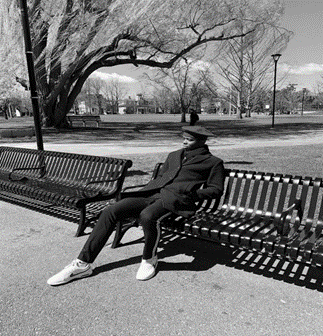Friday Poetry: Romeo Oriogun’s Nomad: A Literary Account of Home and Migration
Arguably, to talk about poetry is to talk about how it contours its profound meanings to evaluate the universe. When Samuel Johnson said, “The two most engaging powers of an author are to make new things familiar, and familiar things new.”, it can be said that he had prefigured Romeo Oriogun’s way of poetry. Oriogun’s Nomad is a manifestation of aesthetics revolving its tendrils around a voyage. Little wonder why Jerry Chiemeke says on Olongo Africa: “Oriogun breathes art and has proved his mettle as one of the finest ambassadors for a generation of young, irreverent, convention-defying African poets.”
The poem, The Beginning, opens its curtains with a figure of sound — an alliteration. The author employs the use of this said alliteration in the very first verse of the poem to foreground an imagery that aligns with the title of the poem. The line, Before the bus sped towards the border, logically has its sound aligned with the title of the poem, Beginning, to reproduce a mood of euphony, of unity in a poem and its poet.
Also, one can orbit around the hidden meaning of the title of the poem: The Beginning. From the title of the poem, a reader is therefore sewn into a cloak of uncertainty about the word(s) or phrase that should serve as a partitive to it. Thus, the question — is it the beginning of life, of hope, of freedom, of restriction, or of a journey? — arises from the part of the readers. Nevertheless, an assessment of the title of the book itself gives away the true intent behind the meaning of the title of the poem: The Beginning. Since Nomad, as a word, foregrounds the motif of a pilgrimage, one can make a conclusion with these facts that the poem — The Beginning — reflects the beginning of a journey from one world to another world entirely. The message behind the title is further foregrounded in /the sudden silence wherein an old world is lost, a new world is created, and in leaving we seek the unfurling of new wings, the naming of new cities, the gift of green rolling hills/.
The main motif of the poem, The Beginning, is unarguably that of emigration. The line /into a singular prayer of leaving/ foreground that motif throughout the actualization of the poem. One can then converse about the poet’s persona’s intention to leave his home to live within the claws of another. There is the part of a man kneeling on wet earth to also reiterate that fact of their departure, even if they know that /what we are leaving behind will never wait for us/.
Notably, one can allude to how this poem reflects the reality of Nigerian literati. We live in a part of the world where these artists believe can kill their art, so that they find every opportunity they can to leave their world and transition into another. What is more, Romeo Oriogun — the poet — himself is a poet in diaspora at the time of publication. So, one can say that the poem might reflect some parts of his reality, if not all.
Saheed Sunday, NGP V, is a Nigerian poet, a Star Prize awardee, a Best of the Net nominee, and a HCAF member. He is the author of a poetry collection: Rewrite The Stars. He won the ZODML Poetry Prize; he was shortlisted for the Rachel Wetzsteon Chapbook Award, Wingless Dreamer Poetry Prize and The Breakbread Literacy Project.





